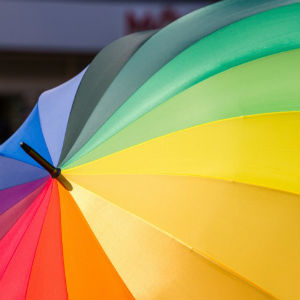 The English lexicon is estimated to contain more than a million words, and yet when it comes to the vocabulary of sex and gender, there are many gaps. For example, we are stuck calling a 62-year-old man someone’s “boyfriend” because we don’t have a more appropriate option.
The English lexicon is estimated to contain more than a million words, and yet when it comes to the vocabulary of sex and gender, there are many gaps. For example, we are stuck calling a 62-year-old man someone’s “boyfriend” because we don’t have a more appropriate option.
Most of the time, it might not be such a big deal. For the transgender community, however, there is a lot more at stake in a vocabulary shortage.
Language is very powerful. We use it to pass knowledge down to future generations, to design new things, and to create social structure. It is used to form relationships, share our thoughts and feelings, and to conduct our lives. We even use language to define ourselves—Irish American, teacher, Buddhist, jazz lover—in order to establish our unique identity among billions of other humans.
Minority groups, however, generally don’t define themselves; the dominant culture chooses words for them, and they are almost always derogatory. Language in those cases is used as a weapon by those in power. But language can also be a tool of empowerment by uniting a group and giving it a voice.
Members of the transgender community struggle to define themselves in English. We have no neutral pronouns (“it,” although preferred by a minority of transgender people, more often is viewed as highly derogatory), and gender is always described through the limits of a binary system—male/female. “Ze” is used by some people, but hasn’t gained popular use yet, probably because society is slow to change, particularly when it comes to sex and gender issues. So transgender people have had to create their own language of identity.
I have not yet discovered a list of terminology that all gender-variant people agree on. And without common language, it is difficult to have discourse on the issues. Listing all terms people use to identify themselves in each article or discussion would make reading or speaking on the topic virtually impossible. Therefore, I and many others use the term “transgender” to represent all those who do not fit into the man/male/masculine or woman/female/feminine binary.
For those who are unfamiliar with transgender vocabulary, I have listed some terms here that are used by some major organizations that support the transgender community. Not all are universally embraced.
- Transgender: An umbrella term for those whose gender identity and/or expression is different from the sex they were assigned at birth. “Trans” or “trans*” are also used, although there, too, is controversy. “Gender-variant” and “gender atypical” are often used within the medical community.
- Gender identity: An individual’s internal sense of being male, female, neither, or some combination of both. Since gender identity is internal, one’s gender identity is not necessarily visible to others. A few of the terms people use to identify themselves are bigender, genderqueer, gender nonconforming, gender bender, gender fluid, and pangender.
- Gender expression: The external manifestation of a person’s gender identity. Usually expressed through behavior, clothing, hair style, speech patterns, mannerisms, and so on.
- Trans (gender man): Generally refers to someone who was identified female at birth but who identifies and portrays gender as male. Sometimes the expressions FTM, F2M, or affirmed male are also used. It’s important to understand that not everyone is comfortable with all terms.
- Trans (gender) woman: Generally refers to someone who was identified male at birth but who identifies and portrays gender as female. Also used by some: MTF, M2F, affirmed female.
- Transsexual: An older term, which originated in the medical and psychological communities, for people whose gender identity is different from their assigned sex at birth who seek to transition from male to female or female to male. Transsexual is NOT an umbrella term and may be considered offensive unless it’s a person’s identity, and some transsexuals distinctly separate themselves from the term transgender.
- Cross-dresser: One who occasionally wears clothing traditionally associated with people of the opposite sex (in a binary gender system), and is usually comfortable with the assigned sex. Cross-dressing is not indicative of sexual orientation. “Cross-dresser” is generally viewed as an outdated label and may be considered offensive to some.
- Transition: The process that people go through as they change their gender expression and/or physical appearance to align with their gender identity. Length of the transition period will vary greatly from person to person. Transitioning is a very individual process, and not every transgender person elects to have surgery, change legal documents, use hormones, etc.
For more information about transgender language, see the resources below.
References:
- Transgender Terminology: January 2014, National Center for Transgender Equality. Retrieved 3/21/14 from http://www.transequality.org/Resources/TransTerminology_2014.pdf
- GLAAD Media Reference Guide: Transgender Glossary of Terms. Retrieved 3/21/14 from https://www.glaad.org/reference/transgender
- Glossary of Gender and Transgender Terms, January 2010 Revision; Fenway Health. Retrieved 3/21/14 from http://www.fenwayhealth.org/site/DocServer/Handout_7-C_Glossary_of_Gender_and_Transgender_Terms__fi.pdf?docID=7081
© Copyright 2014 GoodTherapy.org. All rights reserved.
The preceding article was solely written by the author named above. Any views and opinions expressed are not necessarily shared by GoodTherapy.org. Questions or concerns about the preceding article can be directed to the author or posted as a comment below.

 Study Finds Transgender Children Aren't ‘Confused’ After All
Study Finds Transgender Children Aren't ‘Confused’ After All The Phony Debate about Transgender and Gender-Nonconforming Youth
The Phony Debate about Transgender and Gender-Nonconforming Youth Fitting In, Standing Out: Bigotry in the LGBT Community
Fitting In, Standing Out: Bigotry in the LGBT Community